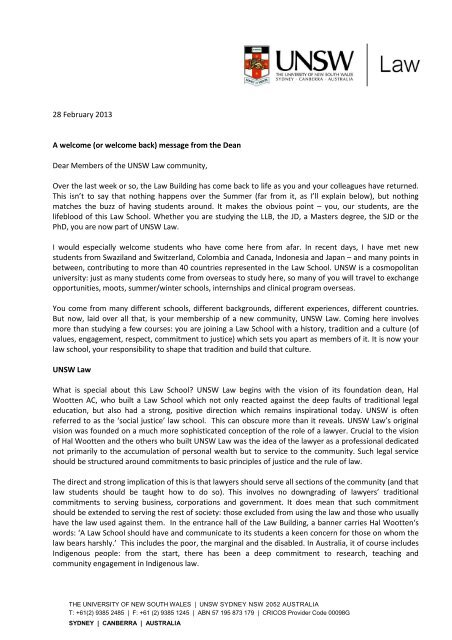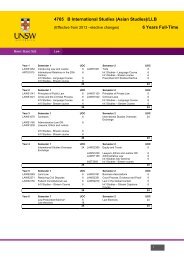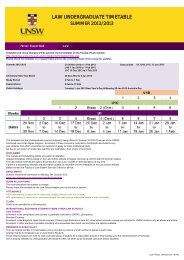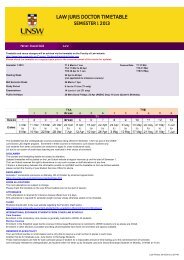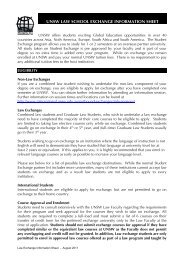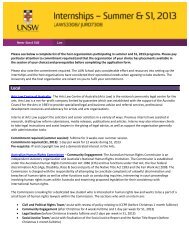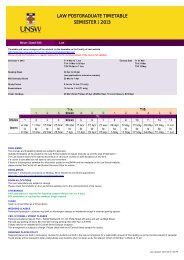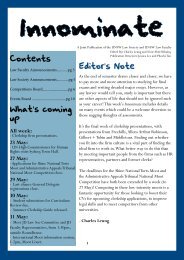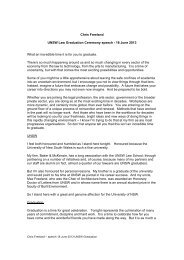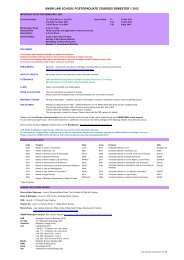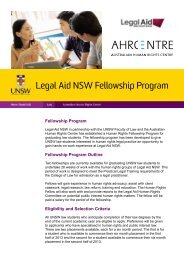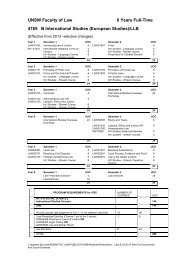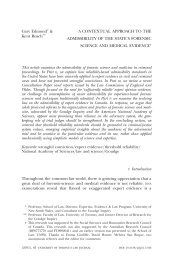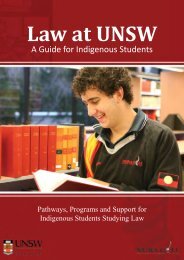Read Professor David Dixon's welcome letter to Law ... - UNSW Law
Read Professor David Dixon's welcome letter to Law ... - UNSW Law
Read Professor David Dixon's welcome letter to Law ... - UNSW Law
You also want an ePaper? Increase the reach of your titles
YUMPU automatically turns print PDFs into web optimized ePapers that Google loves.
Catalogue of U.S. Geological SurveyStrong-Motion Records, 1990Compiled by Josephine C. Switzer, andRonald L. PorcellaU.S. GEOLOGICAL SURVEY CIRCULAR 1093
<strong>UNSW</strong> <strong>Law</strong> Page 3 of 4from Children’s Rights <strong>to</strong> Public <strong>Law</strong>. Most of our centres are based in the Centres Precinct, which you canfind off the first floor corridor which leads <strong>to</strong> KLC (and the Roundhouse). You will have opportunities <strong>to</strong> beinvolved both as a volunteer and for course credit as an intern. There are also a number of researchfocused initiatives – on climate change, international law, private law. (For details of all of these, seewww.law.unsw.edu.au/centres)I would strongly encourage you <strong>to</strong> get involved in at least one of the many activities which take placeoutside the classroom. As well as the centres, there is mooting, the <strong>UNSW</strong> <strong>Law</strong> Journal, men<strong>to</strong>ring, and awide range of activities organised by the <strong>UNSW</strong> <strong>Law</strong> Society. Think about getting involved in somethingnew, something different, something challenging. If you haven’t been overseas, go on exchange. If you areset on working in a merchant bank, try working in a community law centre. If you always wanted <strong>to</strong> be aninternational human rights lawyer, check out commercial litigation. Stretch yourselves, and your minds.While I know that you have very busy lives, it’s vital not <strong>to</strong> let law school mean just turning up at classes.Take time <strong>to</strong> find out about what goes on in your <strong>Law</strong> School. Many students seem <strong>to</strong> think that we spendall our time on holiday when you aren’t here. Nothing could be further from the truth. Since last semester,some highlights of a mass of activity have been a research symposium with colleagues at the University ofHong Kong; the Gilbert + Tobin Centre of Public <strong>Law</strong>’s constitutional <strong>Law</strong> conference; a human rights clinicalprogram in Johannesburg; and an international workshop on surveillance and counter-terrorism.Less visible is the mass of research being produced by your lecturers - which won us <strong>to</strong>p rating in theAustralian Research Council’s assessment - published in books, journal articles, book chapters, conferencepapers, and submissions <strong>to</strong> official inquiries. We have more senior research fellowships than any other lawschool. For more details of the Faculty’s research, have a look at the book case and the recent publicationsboard opposite the reception counter on level 2, or www.law.unsw.edu.au/research.There are many new faces around the <strong>Law</strong> School: more than half of your lectures have joined <strong>UNSW</strong> in thelast 6 years, during which we have been able <strong>to</strong> pick the best academic talent. Recent appointments includeJustine Rogers (teaching <strong>Law</strong>, Justice & Etics); Lucas Lixinski (teaching <strong>Law</strong> in Global Contexts); Vicki Sentas(teaching criminal law and the new police powers clinic at Redfern Legal Centre); Amrita Kapur (teachingcriminal law and international criminal justice); and Bronwen Morgan, a Future Fellow, researchingregulation). Finally, I’m delighted <strong>to</strong> announce the appointment of Ronald Sackville and Margaret S<strong>to</strong>ne asVisiting <strong>Professor</strong>ial Fellows. Two very distinguished judges of the Federal Court, they join Michael Kirby(previously Justice of the High Court) and Keith Mason (formerly President of the NSW Court of Appeal.Ronald and Margaret will contribute <strong>to</strong> the Faculty in a number of ways, including writing, teaching andmen<strong>to</strong>ring.From 1971 <strong>to</strong> 2013Of course, much has changed in the years since <strong>UNSW</strong> <strong>Law</strong>’s establishment, and it has changed. <strong>Law</strong> ischanging, with international perspectives, regulation and dispute resolution becoming central. Moregenerally, international experience in legal practice (public or private) has become much more common, sothat employment or further education overseas has become normal for many graduates. Our concerns withthe socially marginal now include those elsewhere in the world, notably in our region, including TimorLeste, Myanmar and Vietnam, with which we have long relationships. This is a great time <strong>to</strong> be coming <strong>to</strong><strong>UNSW</strong>, as we launch our new LLB and JD curricula which will set a new benchmark for progressive legaleducation.However, much of the <strong>UNSW</strong> <strong>Law</strong> tradition established by Hal Wootten remains very relevant. A vitalelement of it involves a commitment <strong>to</strong> collegiality and civility in how we treat each other. When I firstcame here many years ago, this was one of the characteristics which I found attractive - and very differentfrom what I experienced at law school in England. It includes good relations between staff (of all kinds) andstudents, and a willingness <strong>to</strong> respect and learn from those with whom we disagree. Both of these are, of


